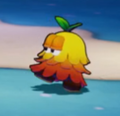Capnap: Difference between revisions
No edit summary |
No edit summary |
||
| Line 3: | Line 3: | ||
|first_appearance=''[[Mario & Luigi: Dream Team]]'' ([[List of games by date#2013|2013]]) | |first_appearance=''[[Mario & Luigi: Dream Team]]'' ([[List of games by date#2013|2013]]) | ||
|latest_appearance=''[[Mario & Luigi: Brothership]]'' ([[List of games by date#2024|2024]]) | |latest_appearance=''[[Mario & Luigi: Brothership]]'' ([[List of games by date#2024|2024]]) | ||
|variants=[[Capnap R]]<br>[[Dreamcap]]<br>[[Dreamcap Captain]] | |variants=[[Capnap R]]<br>[[Dreamcap]]<br>[[Dreamcap Captain]]<br>[[Glohm Capnap]] | ||
}} | }} | ||
Revision as of 12:09, November 14, 2024
| Capnap | |||
|---|---|---|---|
Sprite from Mario & Luigi: Dream Team | |||
| First appearance | Mario & Luigi: Dream Team (2013) | ||
| Latest appearance | Mario & Luigi: Brothership (2024) | ||
| |||
Capnaps are sleepy creatures covered in yellow flaps with several strands of grass on their heads that appear in Mario & Luigi: Dream Team and Mario & Luigi: Brothership. Its name is a portmanteau of "cap" and "catnap".
History
Mario & Luigi: Dream Team
In Mario & Luigi: Dream Team, Capnaps appear in Mushrise Park and may sometimes appear alongside Thorbs. Three of them are required to battle, which serves as a tutorial for Bros. Attacks. In battle, Capnaps have many attacks. They may teeter drowsily back and forth near a Bro., who must either smack the ground near it with his hammer to wake it up, or smash the Capnap itself before it inevitably crashes into him. Capnaps also are able to run at both Mario and Luigi by running into the foreground or background and dashing straight towards them, where they must jump as the Capnap nears them to avoid it.
A Capnap may also attempt to charge into a Bro. after approaching him, which can be evaded by jumping before the Capnap hits him. Sometimes the Capnap falls asleep before it is awakened by a noise and attacking. In this case, the Bros. must time their jumps properly.
Variants of Capnaps appear in the Dream World, being Dreamcaps and Dreamcap Captains. These in turn have stronger variants, the Dreamcaps R and Dreamcap Captains R.
Mario & Luigi: Brothership
In Mario & Luigi: Brothership, Capnaps appear in the Lushgreen Sea Great Lighthouse Island and may sometimes appear alongside Spikelys. They use the same attacks as in Mario & Luigi: Dream Team. Stronger variants called Capnaps R appear in Bulbfish Island. When Gobblick performs its spit attack, it may sometimes spit them along with the aforementioned Spikelies and Coins.
Later in the game, Capnaps are infected with Glohm and become much stronger.
Statistics
Mario & Luigi: Dream Team
| Mario & Luigi: Dream Team enemy | ||||||||
|---|---|---|---|---|---|---|---|---|
| Capnap | ||||||||
| HP | 16 | Role | Common | Level | 5 | Location(s) | Mushrise Park | |
| Power | 40 | Position | Normal | No Hitter | 5 | |||
| Defense | 38 | World | Real | Weakness | None | Item drop | Mushroom (5%) Candy (2%) | |
| Speed | 23 | Experience | 15 (18) | Coins | 5 (100%) | |||
Gallery
Names in other languages
| Language | Name | Meaning | Notes |
|---|---|---|---|
| Japanese | ネムルダケ[?] Nemurudake |
From「眠る」(nemuru, "to sleep") and the voiced version of「茸」(take, "mushroom") | |
| Chinese | 昏昏欲睡菇[?] Hūnhūnyùshuì Gū |
Sleepy Mushroom | |
| French (NOA) | Mycopillon[1] | Portmanteau of mycose ("mycosis") and roupillon ("snooze") | |
| French (NOE) | Roupignon[2] | From roupiller ("to sleep") and champignon ("mushroom") | |
| German | Nickerling[?] | From nickerchen ("to nap") and the diminutive suffix -ling | |
| Italian | Gapibapo[?] | Possibly from Gabibbo, an Italian television mascot with a vaguely similar expression, whose name derives from a Genoese ironic-depreciative expression | |
| Korean | 꾸벅송이[?] Kkubeogsong'i |
Portmanteau of "꾸벅꾸벅" (kkubeog-kkubeog, "dozing off") and "송이" (song'i, "Matsutake") | |
| Portuguese | Sonomelo[?] | From sonolento ("sleepy") and cogumelo ("mushroom") | |
| Russian | Грибохрап[?] Gribokhrap |
From гриб (grib, "mushroom") and храпеть (khrapet, "to snore") | |
| Spanish (NOA) | Reposeta[?] | From reposar ("to rest") and seta ("mushroom") | |
| Spanish (NOE) | Modorrón[?] | Augmentative form of modorra ("drowsiness") |
